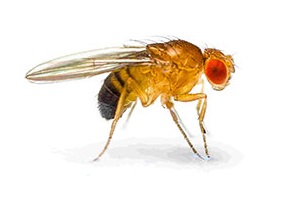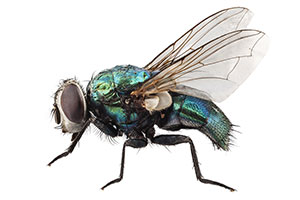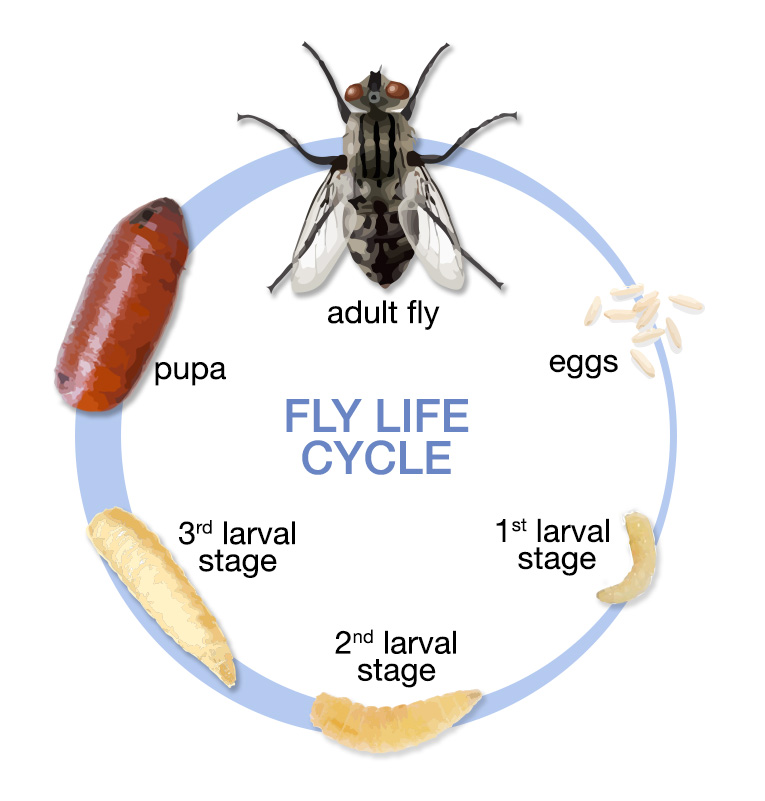
Professional Fly Control Services
Call us at 647-708-7378
Request A Free Quote
Fly Control
Flies are disgusting pests that like to enter our homes to spread bacteria and disease. While to many, flies are simply a nuisance, it is important to note that if a fly problem is not handled it can continue to grow until it becomes a health issue.
Flies reproduce at an incredibly rapid pace, so for every fly buzzing around your living room, there are hundreds of larvae developing into flies somewhere else in your home. It is important to stop these pests early to prevent infestation.
If you have a fly problem, call Power Pest Control today and let one of our expert exterminators handle the issue for you.
Our Process
1. Our team of fly removal experts will perform a /contact-us/ free quote over the phone to give you a basic understanding of cost and how we implement our game plan strategy to eliminate your fly problem.
2. Once onsite, we will be able to quickly identify the type of fly species causing you discomfort.
3. Our fly control experts will conduct a detailed analysis of the property, assessing access points areas of attraction for the flies.
4. Once we have an understanding of the general movement of the activity in and around your property, we will explain to you how we plan to resolve your problem.
5. With your approval, we will begin the fly extermination process.
SUCCESS STORIES
Signs of Flies in Your Home
The most common sign of flies in the home would be the fly itself. Flies are bold enough to enter a room full of people and take a couple laps around. They will typically be found in food bins and around trashcans.
However, another way to determine a fly infestation is by seeking out the small dark clusters of spots that the flies tend to leave behind.
Finally, a clear indicator on the pests would be the maggots they leave. Flies are about to lay about 500 eggs at once, and if they choose your home to do that, you will be able to see the little white eggs.
Problems with Fly Infestation
While no one wants flies hanging around their home, many see the pests more as a nuisance than as a serious problem. However, the issues with flies can go far beyond their pestering tendencies. These bugs can cause permanent harm by spreading disease, contaminating food, and even biting humans and animals in some cases. This is why it is important to act quickly is you believe your home or business is being infested. Because they reproduce so quickly, it is not uncommon to need a professional to get rid of the pests.
How to Remove Flies from Your Home
Common DIY methods- and why they are ineffective
Fly Swatter– They even make electric fly swatters now. Many people choose to keep on of these swatters near them at all times during fly season, and when a fly gets close to you, just hit it.
Gallon Bag- Many choose to half-fill a gallon zip lock bag with water. They then hang the bag in their doorways and entrance points. The water will distort the fly’s vision and cause it to avoid the entrance.
Apple Cider Vinegar- Some people will pour a half a cup of apple cider vinegar into a mason jar. They will then poke holes in the jar’s lid and close it. When this substance is heated up, it attracts flies. They enter the jar to get to the fermented liquid and are then unable to get out.
Cloves and lemon- While the two ingredients make a very pleasant aroma for the human nose, flies cannot stand it. Therefore, many people choose to cut a lemon in half and poke 6-12 cloves into the lemon. If you leave the creation in the middle of a table, you are supposedly guaranteed a fly-free meal.
Venus Fly Trap- Many choose to let nature do the work for them and purchase a venus fly trap. A venus fly trap is a plant that actually feeds on flies. The plant attracts the flies to its bristles, then snaps closed on the fly once it lands and sticks to the plant.
Hot Pepper- Many choose to turn to kitchen spices to get rid of the pests. You can make hot pepper spray by mixing together three to four fully grown peppers in a blender. Once this is turned into a paste you can add 3-4 cups of water. Once you remove this mixture keep it in the sun for a week. Once the mixture is baked in the sun you will pour it into a spray bottle. You will use this in any area in which flies are present.
Fan– Sometimes the solution can be as simple as turning the fan on. Because flies are so light, their flight pattern can be a bit disturbed by the extra wind that blows when you have the fan on.
UV Trap- These are simple traps you can buy at the store. The UV light attracts the fly as a bait, and a low-grade electric grid will zap the fly when it enters the area.
Jug Trap– Some choose to use an old milk jug as a fly trap. Simply take the jug and provide some kind of bait, whether that be apples, honey, or any other object that you believe the fly will be attracted to. Poke a few holes in the jug. The flies will be attracted to the holes, and will get trapped in the jug. They will eventually suffocate and die.
Essential Oils- Many people turn to essential oils for just about every problem, and flies are no exception. Many people mix the lavender essential oil with water. This substance, while pleasant for humans, repels flies.
These may all be effective ways to keep flies out of a specific area. However, they will be ineffective in ridding your home of flies entirely. Even if you trap and kill the fly, there is a very likely chance that there are hundreds of maggots laid in your house that are getting ready to hatch. So, while these methods are very convenient, and some very pleasant for a specific living area, you will need to take much more extreme measure to get rid of the flies once and for all.
Why Call a Professional Exterminator?
If you have a fly infestation, it is important that you hire a team of professionals to knock out the entire problem, not just a few rogue flies. While flies may seem like a small problem, the infestation can multiply by the hundreds, and so can the germs and bacteria being spread around your house by the pests. The best way to combat the problem and to ensure you exterminate the whole army, not just one soldier, is by hiring a professional exterminator.
1. Knowledge in the area- A professional exterminator knows the areas of fly extermination. He will be able to know where to look for the flies and for the maggots, and he will be able to kill it before it can reproduce. He will also have a clear idea of what products work best for each area so that he can get rid of the pests without causing any harm to your family or pets through harsh chemicals.
2. Understanding of the species- Not only would an experienced exterminator have an understanding in the areas of fly extermination, but he will also have significant knowledge of the entire species. He will know where each fly is more likely to lay eggs, and which fly is causing the nuisance in your home. He will then be able to treat your home on a species bases, and not just for pests as a whole, which could be significantly less effective.
3. Professional equipment- Many store-bought insecticides will not work on flies because of how rapidly they reproduce. A professional exterminator will know the right equipment to bring in on the job, and he will be able to use this equipment to be as effective as possible.
4. Effective substances- As mentioned before, a trained exterminator would have the right chemicals for the job. This means he’ll be able to kill all of the flies, without causing any harm to your family or pets.
Inspection- When you choose to use on of our experienced exterminators to handle your fly infestation, we will first conduct an inspection on your home. In this inspection, we will locate any potential entry or exit points, as well as any storage or trash areas that may attract the flies.
Treatment- Once we locate the flies, their entrance points, and the areas in which they laid their eggs, we will begin treatment. While this treatment will contain multiple strategies to attract and kill current flies, the main focus will be on locating maggots and killing them, before they can become a serious problem.
How We Approach the Process
We will start the process by identifying the species of fly we are dealing with. Some fly species look different, so we want to be clear that we are well aware of the exact species we are dealing with.
Once we have identified the specifics in terms of species we consult with our extremely experienced and qualified staff in order to decide on the right approach and treatments to use for the extermination. In doing this we will analyze the household, and the infected area. We want to make sure we are using the safest possible options, especially since many times flies choose to lay eggs in areas where humans store food and supplies.
Once we decide on the right approach, we executive with our safest solutions. These solutions not only promise not to negatively affect your family with chemicals and toxins, but they also ensure long-term results.
How to Prevent Flies from Returning
Follow up- Moving forward, we will provide multiple strategies that you can use to stop the flies from returning. We will locate what attracted the pests in the first place and advise you to make changes to discourage a return. This might look like purchasing a cover for your trashcan or storing fruit in the refrigerator.
About Flies
Types of Flies

Fruit Flies- This fly was named based on the fact that it is found breeding and developing in fruit and other organic matter. Fruit flies can either have black eyes or red eyes and name appropriately black eyed fruit fly and the red eye fruit fly. The fly becomes a pest because of its quick reproduction rate despite their 8-10 day life cycle. In this time, the adults will mate in two days, and the females can lay up to 500 eggs.
While fruit flies are known to be a public nuisance, their presence can be dangerous. The flies have been known to carry diseases, and this is spread through the fruit and out food they come in contact with.

Bottle & Blow Flies – These are the flies you likely see around dumpsters and garbage cans. The reason for this is, they prefer to lay and develop their eggs on decomposing meats and organic matter. In some cases, they will even choose to lay their eggs in human waste. The most commonly seen of these flies would be the blue and green bottle flies, distinguished by their shiny blue or green exterior. These flies typically enter households in the spring and summer through open windows and doors.
Like the fruit flies, these flies are commonly seen as a nuisance, however they can also be very dangerous. Because of the waste they tend to land on, they are carriers of a plethora of germs and bacteria.
What Flies Eat
If you understand what flies eat, it can help you prevent them from taking rest in your home. Adult bottle and blow flies will lay their larvae, and then feed their larvae on organic decaying material. This is why they are often found In and around your garbage can. They are considered general feeders, meaning they eat just about anything they can get. This might be food, waste, animal carcasses, or even fecal matter. The way their mouth is designed only allows them to feed on liquids, so they will first regurgitate the food in order to consume it. Their mains foods of attraction are surgery substances, overripe fruits and vegetables, and fecal matter.
Fruit flies are slightly different in their food preference. They are typically attracted to foods that have fermented such as overripe fruits, and less attracted to trash and decaying material. They are very common in house kitchens as well as in restaurants if sanitary measures are not strictly upheld. In addition to fermented foods, fruit flies are attracted to fermented liquids including all wine and beer, vinegar, and ciders. Like their fellow bottle and blow flies, fruit flies are attracted to overripe fruits as well as sugary substances such as soda and candy.
Life Cycle
All flies start as an egg. The female fly is capable of laying around 150 eggs per batch, and capable of laying batches for multiple days in a row. These eggs will hatch into larvae, or maggots, in a single day’s time. These creatures are white and legless. They feed form the area in which they were laid for three to five days. This is why flies tend to lay their eggs in areas of trash or decomposing material. During this three to five day period, the larvae will molt multiple times. They will then find a dark place to pupate.
In this stage, the fly is considered a fly pupae. This stage is extremely similar to a caterpillar’s transition to a butterfly. The pupae are hard and protective brown shells that cover the developing fly. Over the next three to six day period, the pupae develop legs and wings. They will eventually emerge from the pupae as a fully-grown fly.
The pupae can reproduce in about three days from the hatching, and this begins the process all over.
With this entire process included, the entire life expectancy of a fly is about 15 to 30 days, and this is without consideration of temperature or, of course, exterminators.

Why They Like Living in Homes
Obviously, the fly got into your home through an open door or window, but why did they stay? The thing to remember is, flies are not particularly wise creatures. Once they entered through the door or window, they are unable to leave. I’m sure you’ve watched a fly run into a window time and time again seeking an escape. However, when they can’t escape, they choose to lay their eggs inside of your house. So, while it feels like the exact same fly has hung around for about a month now, odds are it simply got stuck, and now its baby is also stuck in your house, and it is this baby that is flying around your living room at all hours of the day.
What to do if you Have a Fly Infestation
If you have a fly infestation, the matter should be handled quick and professionally for the safety of your home and your family. Don’t wait until the problem grows, and don’t try to handle it yourself with remedies found online.
Ready to rid your home of the flies once and for all? Then you need powerful insect removal from the team at Power Pest Control in Toronto. Our expert exterminators at Power Pest Control are the Greater Toronto Area’s local, certified pest experts. We provide fast, safe control anywhere in Toronto. Call us now at 647-708-7378 or reach out to us online.
AREAS WE SERVICE
Power Pest Control has been a quality provider of the best pest control and extermination service since our establishment. It is with great pride and joy we announce that we serve our customers in Toronto and all neighboring areas. We want you to be able to reach us wherever you are promptly and conveniently. Choose your location and click below for additional information.
YOUR PEACE OF MIND COMPANY… CALL US 647-708-7378


